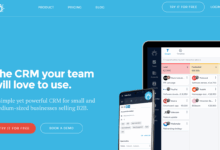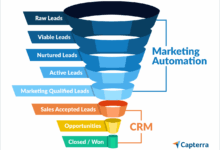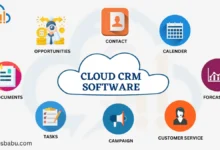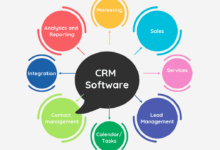AI-Powered CRM Software: A Business Advantage
AI-Powered CRM Software is revolutionizing how businesses manage customer relationships. No longer are CRM systems just databases; they are intelligent platforms leveraging machine learning, natural language processing, and predictive analytics to automate tasks, personalize interactions, and ultimately drive significant revenue growth. This transformative technology empowers businesses of all sizes to understand their customers better, anticipate their needs, and foster stronger, more profitable relationships.
This exploration delves into the core functionalities, benefits, implementation strategies, and future trends of AI-powered CRM software. We will examine how these systems enhance sales, marketing, and customer service, providing a comprehensive overview for businesses seeking to optimize their customer engagement and achieve a substantial return on investment.
Defining AI-Powered CRM Software
AI-powered CRM software represents a significant evolution from traditional CRM systems. While traditional CRMs primarily focus on data organization and management, AI-powered CRMs leverage artificial intelligence to automate tasks, analyze data for insights, and ultimately improve sales, marketing, and customer service efficiency. This enhanced functionality allows businesses to interact with customers more effectively and personalize their experiences at scale.
The core difference lies in the incorporation of intelligent automation and predictive capabilities. AI-powered CRMs go beyond simply storing customer information; they actively learn from this data to predict future behavior, personalize interactions, and automate repetitive tasks, freeing up human resources for more strategic initiatives.
Core Functionalities of AI-Powered CRM
AI-powered CRM software offers a range of functionalities driven by artificial intelligence. These features significantly enhance the capabilities of traditional CRM systems, allowing for more efficient and effective customer relationship management. Key functionalities include lead scoring and prioritization, automated lead nurturing, predictive analytics for sales forecasting, and personalized customer interactions through targeted marketing campaigns and chatbots. The automation of routine tasks such as data entry and email marketing frees up valuable employee time for higher-value activities, leading to increased productivity and improved customer satisfaction.
Types of AI Used in CRM Software
Several types of artificial intelligence are integrated into modern CRM systems to deliver their advanced capabilities. Machine learning algorithms are central to many AI-powered CRM features. For example, machine learning enables predictive lead scoring by analyzing historical data to identify which leads are most likely to convert into paying customers. Natural language processing (NLP) allows the CRM to understand and respond to customer inquiries in natural language, powering intelligent chatbots and sentiment analysis tools that gauge customer satisfaction from feedback. Deep learning, a subset of machine learning, can be used to create more sophisticated predictive models and personalize customer journeys at an even deeper level. Computer vision, while less commonly used in CRM directly, can be integrated to analyze images and videos related to customer interactions, potentially useful in industries like retail or real estate.
Benefits and Advantages
AI-powered CRM systems offer a significant leap forward in managing customer relationships, providing substantial benefits across various business functions and scales. The integration of artificial intelligence streamlines processes, enhances efficiency, and ultimately boosts profitability by fostering stronger customer connections. This section details the key advantages across different business sizes and operational areas.
Implementing AI-powered CRM software yields substantial improvements in sales, marketing, and customer service. The automation of repetitive tasks frees up valuable employee time, allowing them to focus on higher-value activities that directly contribute to revenue generation and customer satisfaction. Simultaneously, AI’s predictive capabilities enable proactive strategies, leading to improved lead generation, targeted marketing campaigns, and personalized customer experiences.
Impact on Sales Efficiency
AI significantly boosts sales efficiency by automating lead scoring and prioritization. The system analyzes various data points – website activity, email engagement, social media interactions – to identify high-potential leads. This allows sales teams to focus their efforts on prospects most likely to convert, resulting in increased sales conversion rates and reduced wasted time on unqualified leads. Furthermore, AI-driven sales forecasting provides accurate predictions, enabling better resource allocation and strategic planning. For instance, a small business could use AI to identify ideal customer profiles and target advertising more effectively, while a large enterprise could use it to predict future sales trends and optimize inventory management.
Impact on Marketing Efficiency
AI-powered CRM systems revolutionize marketing by enabling highly targeted campaigns and personalized messaging. By analyzing customer data, AI identifies specific customer segments with shared characteristics and preferences. This allows marketers to create tailored campaigns that resonate more effectively with each segment, increasing engagement and conversion rates. For example, AI can personalize email marketing by dynamically adjusting the content based on individual customer behavior and preferences, leading to higher open and click-through rates. A/B testing is also significantly enhanced, with AI suggesting optimal variations of marketing materials based on real-time performance data.
Impact on Customer Service Efficiency
AI-powered chatbots and virtual assistants provide instant support to customers, resolving common queries and issues 24/7. This reduces the workload on human agents, allowing them to focus on more complex problems requiring human intervention. AI can also analyze customer interactions to identify trends and patterns, providing valuable insights into customer needs and pain points. This information can be used to improve products and services, enhancing overall customer satisfaction. For instance, an AI-powered CRM could analyze customer feedback from surveys and social media to identify areas for improvement in a company’s product or service. This proactive approach to customer feedback management is a key differentiator.
Enhanced Customer Relationship Management and Improved Customer Satisfaction
AI empowers businesses to understand their customers on a deeper level. By analyzing customer data across multiple touchpoints, AI creates a holistic view of each customer’s journey. This enables businesses to personalize interactions, anticipate customer needs, and proactively address potential issues, fostering stronger customer relationships and increased loyalty. Personalized recommendations, proactive customer service, and targeted marketing initiatives all contribute to a superior customer experience, resulting in higher customer satisfaction and retention rates. For example, an e-commerce business could use AI to recommend relevant products to customers based on their past purchases and browsing history.
Return on Investment (ROI) Comparison: Traditional CRM vs. AI-Powered CRM
| Feature | Traditional CRM | AI-Powered CRM |
|---|---|---|
| Lead Qualification | Manual, time-consuming | Automated, faster, more accurate |
| Sales Forecasting | Based on historical data, less precise | Predictive analytics, higher accuracy |
| Customer Segmentation | Manual, limited granularity | Automated, highly granular, dynamic |
| Customer Service | Relies heavily on human agents | AI-powered chatbots, reduced agent workload |
| ROI | Moderate, dependent on effective manual processes | Higher, due to automation and improved efficiency |
Features and Capabilities
AI-powered CRM software goes beyond the capabilities of traditional CRM systems by leveraging artificial intelligence to automate tasks, analyze data, and provide valuable insights that drive business growth. These advanced features significantly improve efficiency and effectiveness in managing customer relationships.
AI-powered CRMs offer a wide range of functionalities designed to streamline processes and enhance decision-making. This results in improved sales performance, enhanced customer satisfaction, and a more efficient use of resources.
Predictive Analytics in Sales Forecasting and Lead Scoring
Predictive analytics, a core component of AI-powered CRM, uses historical data and machine learning algorithms to forecast future sales trends and prioritize leads based on their likelihood of conversion. This allows sales teams to focus their efforts on the most promising opportunities, maximizing return on investment. For example, by analyzing past customer behavior, purchase history, and demographic information, the system can predict which leads are most likely to become paying customers. This allows sales representatives to prioritize their outreach and allocate resources effectively. A company using this feature might see a 20% increase in sales conversion rates by focusing on high-scoring leads. Furthermore, accurate sales forecasting allows for better resource allocation, improved inventory management, and more effective budgeting.
Personalized Customer Experiences Through Targeted Marketing and Communication
AI facilitates highly personalized customer experiences by analyzing vast amounts of customer data to identify patterns and preferences. This enables businesses to deliver targeted marketing campaigns and communications that resonate with individual customers. For instance, AI can segment customers based on their purchase history, browsing behavior, and demographics, allowing for the creation of highly relevant and personalized email campaigns, website content, and product recommendations. Imagine a clothing retailer using AI to recommend products based on a customer’s past purchases and browsing history. This tailored approach can significantly increase customer engagement and loyalty.
Integration Capabilities with Other Business Tools
AI-powered CRM systems are designed for seamless integration with other business tools, creating a unified and efficient workflow. This integration allows for a holistic view of customer interactions and data from various sources. For example, integrating the CRM with marketing automation platforms allows for automated email sequences triggered by customer actions within the CRM. Integration with social media platforms allows for monitoring customer sentiment and providing immediate responses. Connecting the CRM with accounting software streamlines billing and payment processes. Such integrations improve data consistency, reduce manual data entry, and provide a single source of truth for all customer-related information, leading to better informed decisions and improved operational efficiency.
Implementation and Integration
Successfully integrating AI-powered CRM software requires a strategic approach that considers organizational structure, existing systems, and employee training. A phased implementation minimizes disruption and maximizes the return on investment. This section details the steps involved, common challenges, and successful implementation examples.
Implementing AI-powered CRM software involves a careful process of planning, execution, and ongoing optimization. The complexity of the process varies depending on the size and structure of the organization, the existing IT infrastructure, and the specific features of the chosen AI-CRM solution. Careful consideration must be given to data migration, user training, and ongoing support.
Steps Involved in Implementing AI-Powered CRM Software
The implementation of AI-powered CRM software typically follows a structured approach. Each stage requires careful planning and execution to ensure a smooth transition and optimal results. Ignoring any of these steps can lead to significant challenges and decreased efficiency.
- Needs Assessment and Planning: This initial phase involves identifying specific business needs and objectives that the AI-CRM will address. This includes defining key performance indicators (KPIs) to measure the success of the implementation. A thorough analysis of existing CRM systems and data infrastructure is also crucial.
- Vendor Selection and Software Configuration: Choosing the right vendor and software involves evaluating different solutions based on features, scalability, integration capabilities, and cost. Once a vendor is selected, the software needs to be configured to meet the specific needs of the organization, including customization of workflows and dashboards.
- Data Migration and Cleansing: Transferring data from existing CRM systems or other data sources to the new AI-powered CRM is a critical step. This process often involves data cleansing to ensure accuracy and consistency. Data quality directly impacts the accuracy and effectiveness of the AI functionalities.
- User Training and Adoption: Effective user training is essential for successful adoption. Training programs should cover all aspects of the software, including the use of AI-powered features. Ongoing support and resources are also necessary to address user queries and provide assistance.
- Integration with Existing Systems: Integrating the AI-powered CRM with other business systems, such as marketing automation platforms, ERP systems, and e-commerce platforms, is crucial for maximizing its value. This integration ensures seamless data flow and enhances overall efficiency.
- Testing and Deployment: Before full deployment, thorough testing is necessary to identify and resolve any issues. A phased rollout approach can minimize disruption and allow for adjustments based on feedback from early adopters.
- Ongoing Monitoring and Optimization: After deployment, continuous monitoring and optimization are essential to ensure the AI-CRM is meeting its objectives and providing value. Regular performance reviews and adjustments are necessary to maximize the return on investment.
Challenges and Considerations During Integration
The integration process often presents various challenges. Addressing these proactively is crucial for a successful implementation.
- Data Integration Complexity: Integrating data from multiple sources can be complex and time-consuming, requiring careful planning and execution.
- Legacy System Compatibility: Integrating with legacy systems may require significant effort and potentially necessitate system upgrades or replacements.
- Data Security and Privacy: Ensuring the security and privacy of sensitive customer data is paramount. Compliance with relevant regulations, such as GDPR, is crucial.
- Change Management and User Adoption: Resistance to change and a lack of user adoption can hinder the success of the implementation. Effective change management strategies are essential.
- Cost and Resource Constraints: The implementation process can be costly and resource-intensive, requiring careful budgeting and resource allocation.
Examples of Successful AI-Powered CRM Implementations
Several companies across various industries have successfully implemented AI-powered CRM systems, achieving significant improvements in efficiency and customer satisfaction. For example, a large retail chain used AI-powered CRM to personalize marketing campaigns, leading to a significant increase in sales conversion rates. A financial institution leveraged AI-driven customer service to improve response times and customer satisfaction scores. These examples highlight the potential benefits of AI-powered CRM across diverse sectors.
Step-by-Step Guide for Successful CRM Software Integration
A structured approach is essential for seamless integration.
- Assess current systems and data: Understand existing CRM systems, data sources, and their limitations.
- Define clear objectives and KPIs: Establish measurable goals for the AI-powered CRM implementation.
- Select a suitable vendor and software: Choose a solution that aligns with business needs and integrates well with existing systems.
- Develop a detailed implementation plan: Outline the steps, timelines, and responsibilities for each phase of the project.
- Migrate and cleanse data: Ensure data accuracy and consistency before integrating it into the new system.
- Train users and provide ongoing support: Empower users with the knowledge and resources to effectively utilize the AI-powered CRM.
- Monitor and optimize performance: Continuously evaluate the system’s effectiveness and make adjustments as needed.
Case Studies and Examples
Seeing AI-powered CRM in action provides a powerful illustration of its transformative potential. The following case studies showcase how diverse organizations across various industries have successfully implemented AI-driven CRM solutions to enhance their operations and achieve significant business results. These examples highlight the tangible benefits and practical applications of this technology.
Several companies have demonstrated remarkable success by integrating AI into their CRM strategies. These implementations range from improving customer service responsiveness to enhancing sales forecasting accuracy and optimizing marketing campaigns. The common thread is a significant improvement in efficiency and a measurable increase in revenue or cost savings.
AI-Powered CRM Success Stories
The table below summarizes key examples of companies that have successfully leveraged AI-powered CRM systems. Note that the results presented are based on publicly available information and company reports, and may not represent the entirety of their achievements.
| Company | Industry | Results Achieved | AI Applications |
|---|---|---|---|
| Salesforce (using Einstein AI) | CRM Software | Improved sales forecasting accuracy by 20%, increased lead conversion rates by 15%, and reduced customer service resolution times by 10%. | Predictive analytics, lead scoring, intelligent automation of tasks. |
| Adobe (using Adobe Sensei) | Software | Enhanced customer segmentation and personalization, leading to a 10% increase in marketing campaign effectiveness and a 5% improvement in customer retention. | Personalized content recommendations, automated marketing workflows, predictive analytics for customer churn. |
| HubSpot | Marketing and Sales Software | Improved sales team productivity by 15%, increased lead qualification accuracy by 20%, and enhanced customer engagement through personalized communications. | Lead scoring, chatbot integration for initial customer interactions, automated email marketing sequences. |
| Amazon | E-commerce | Highly personalized recommendations leading to increased sales conversion rates, improved customer satisfaction through proactive customer service, and optimized inventory management. | Recommendation engines, predictive analytics for demand forecasting, chatbots for customer support. |
Future Trends and Developments
AI-powered CRM software is rapidly evolving, driven by advancements in machine learning, natural language processing, and big data analytics. These advancements are reshaping how businesses interact with their customers, promising more personalized experiences and improved operational efficiency. The future of AI in CRM hinges on several key trends that will significantly impact business operations and customer relationships.
The integration of AI into CRM systems is poised to become even more sophisticated and seamless, leading to transformative changes in how businesses operate and engage with their customers. This evolution will be characterized by a deeper understanding of customer behavior, more effective personalization strategies, and ultimately, stronger customer loyalty.
Predictive Analytics and Proactive Customer Service
Predictive analytics, powered by AI, will move beyond simple forecasting to offer proactive customer service solutions. For instance, an AI-powered CRM could predict customer churn based on usage patterns and engagement levels, allowing businesses to intervene with targeted offers or support before the customer decides to leave. This proactive approach minimizes customer loss and enhances retention rates. Imagine a system identifying customers likely to cancel their subscription and automatically offering them a discount or a personalized upgrade, preventing churn before it occurs.
Hyper-Personalization and Enhanced Customer Experience
AI will continue to refine personalization strategies, moving beyond basic segmentation to deliver truly hyper-personalized experiences. This involves leveraging AI to understand individual customer preferences, behaviors, and needs at a granular level, tailoring interactions and offers accordingly. This could include personalized product recommendations, customized email campaigns, and even AI-powered chatbots that can provide instant, relevant support. Companies like Amazon already utilize this approach effectively, recommending products based on past purchases and browsing history, creating a seamless and personalized shopping experience.
The Rise of Conversational AI and Chatbots
Conversational AI, particularly in the form of sophisticated chatbots, will become increasingly prevalent in customer interactions. These AI-powered chatbots will go beyond simple FAQs, capable of understanding complex queries, handling transactions, and even resolving customer issues autonomously. This leads to improved customer service efficiency, reduced wait times, and 24/7 availability, enhancing customer satisfaction and building loyalty. For example, a banking institution could utilize a chatbot to handle simple account inquiries, freeing up human agents to focus on more complex issues.
Improved Data Security and Privacy
With the increasing reliance on AI in CRM, data security and privacy will become paramount. The development and implementation of robust security measures, including AI-powered threat detection and prevention systems, will be crucial. This ensures customer data remains protected and complies with evolving privacy regulations like GDPR and CCPA. Investing in advanced encryption techniques and data anonymization strategies will be essential for maintaining customer trust and avoiding potential legal repercussions. Companies failing to prioritize data security could face significant reputational damage and financial penalties.
Integration with other Business Systems
The future of AI-powered CRM will involve seamless integration with other business systems, such as marketing automation platforms, ERP systems, and e-commerce platforms. This integrated approach will provide a holistic view of the customer journey, enabling businesses to optimize their operations and deliver more effective, personalized experiences. For instance, a company could integrate its CRM with its marketing automation platform to personalize email campaigns based on customer interactions within the CRM system. This creates a more cohesive and effective customer engagement strategy.
Cost and Return on Investment
Implementing AI-powered CRM software involves a significant investment, but the potential return can be substantial. Understanding the costs and developing a robust ROI calculation is crucial for making an informed decision. This section details the cost breakdown and explores methods for calculating the return on investment.
Cost Breakdown of AI-Powered CRM Software
The total cost of ownership (TCO) for AI-powered CRM encompasses various elements. These costs are not one-time expenses but rather spread across the software’s lifecycle. A comprehensive understanding of these cost factors is essential for accurate budgeting.
- Software Licensing Fees: This is the initial cost of purchasing the software licenses, often varying based on the number of users and features required. Pricing models can range from subscription-based to perpetual licenses.
- Implementation Costs: These include costs associated with setup, data migration, customization, and initial training. Professional services fees from consultants or the vendor can be substantial.
- Integration Costs: Integrating the AI-powered CRM with existing systems (e.g., marketing automation, ERP) can involve significant development and configuration costs.
- Maintenance and Support Costs: Ongoing maintenance, technical support, and software updates are recurring expenses throughout the software’s lifecycle. These costs vary depending on the service level agreement (SLA).
- Hardware and Infrastructure Costs: Depending on the deployment model (cloud-based or on-premise), costs may include server hardware, network infrastructure, and data storage.
- Training Costs: Training employees on using the new software is crucial for successful adoption. This can include internal training sessions or external training programs.
- Data Management and Cleaning Costs: Preparing and cleaning data for optimal AI performance can require significant effort and potentially specialized expertise.
Return on Investment (ROI) Calculation Methods
Calculating the ROI for AI-powered CRM requires a multi-faceted approach. Different methods can be employed to quantify the benefits and justify the investment.
- Increased Sales Revenue: Measure the increase in sales revenue directly attributable to improved lead management, sales forecasting, and personalized customer interactions facilitated by the AI-powered CRM.
- Improved Customer Retention: Calculate the reduction in customer churn and the increased lifetime value of retained customers. This can be expressed as a monetary value.
- Reduced Operational Costs: Quantify the savings achieved through automation of tasks such as lead scoring, customer segmentation, and reporting. This can include reduced labor costs and improved efficiency.
- Enhanced Sales Productivity: Measure the increase in sales productivity per representative, considering factors like deal closure rate, average deal size, and sales cycle length.
- Improved Customer Satisfaction: While difficult to directly quantify in monetary terms, improved customer satisfaction can lead to increased loyalty, positive word-of-mouth referrals, and ultimately, higher revenue.
Hypothetical ROI Scenario
Let’s consider a hypothetical scenario for a mid-sized marketing agency. Before implementing an AI-powered CRM, their annual sales were $1 million, with a 20% profit margin ($200,000). After implementation, they experience a 15% increase in sales revenue ($1.15 million), a 5% reduction in operational costs (saving $10,000), and a 10% increase in sales productivity. The total cost of implementing and maintaining the AI-powered CRM for the first year is $50,000.
ROI = [(Increased Revenue + Cost Savings) – Total Cost] / Total Cost
ROI = [($150,000 + $10,000) – $50,000] / $50,000 = 220%
This hypothetical scenario demonstrates a significant positive ROI. However, actual results may vary depending on factors such as the specific software chosen, the effectiveness of implementation, and the overall business environment. A thorough analysis considering all cost components and potential benefits is crucial for accurate ROI projection.
Security and Privacy Considerations
The increasing reliance on AI-powered CRM systems to manage sensitive customer data necessitates a robust approach to security and privacy. Failing to adequately address these concerns can lead to significant financial losses, reputational damage, and legal repercussions. This section examines the inherent security risks, the importance of data privacy compliance, and best practices for safeguarding customer information within an AI-powered CRM environment.
The storage and processing of sensitive customer data—including personally identifiable information (PII), financial details, and communication records—within AI-powered CRM systems present several security risks. These risks range from unauthorized access and data breaches to the potential misuse of AI algorithms for discriminatory practices or privacy violations. Data breaches can expose sensitive information to malicious actors, leading to identity theft, financial fraud, and reputational harm for both the business and its customers. Furthermore, the use of AI algorithms in CRM systems raises concerns about algorithmic bias and the potential for discriminatory outcomes, impacting certain customer segments unfairly. Effective security measures are crucial to mitigate these risks and maintain customer trust.
Data Privacy Compliance and Regulations
Adherence to data privacy regulations is paramount for organizations utilizing AI-powered CRM systems. Failure to comply can result in substantial fines and legal action. Regulations like the General Data Protection Regulation (GDPR) in Europe and the California Consumer Privacy Act (CCPA) in the United States impose stringent requirements on how organizations collect, process, and protect personal data. These regulations often mandate data minimization, transparency regarding data usage, and the provision of data subject rights, including the right to access, rectification, erasure, and data portability. Companies must implement comprehensive data governance frameworks to ensure compliance and demonstrate accountability. This includes establishing clear data processing policies, conducting regular data protection impact assessments (DPIAs), and implementing appropriate technical and organizational measures to safeguard personal data.
Best Practices for Securing AI-Powered CRM Systems
Implementing robust security measures is critical to protecting customer data within AI-powered CRM systems. This involves a multi-layered approach encompassing various strategies. Data encryption, both in transit and at rest, is essential to prevent unauthorized access to sensitive information. Strong access controls, including multi-factor authentication (MFA) and role-based access control (RBAC), should be implemented to limit access to sensitive data based on user roles and responsibilities. Regular security audits and penetration testing help identify vulnerabilities and weaknesses in the system, allowing for timely remediation. Employee training programs on data security best practices are vital to raise awareness and prevent human error, a major cause of security breaches. Furthermore, organizations should maintain comprehensive incident response plans to effectively manage and mitigate the impact of security incidents. Regular software updates and patching are essential to address known vulnerabilities and prevent exploitation by malicious actors. Finally, adopting a zero-trust security model, which assumes no implicit trust, and verifying every access request, can further enhance the security posture of the system.
Final Wrap-Up
In conclusion, AI-powered CRM software represents a significant leap forward in customer relationship management. By automating processes, personalizing interactions, and providing valuable insights through predictive analytics, these systems empower businesses to achieve unprecedented levels of efficiency and customer satisfaction. Embracing this technology is not just an option for businesses seeking a competitive edge; it’s a necessity for thriving in today’s data-driven landscape. The strategic implementation of AI-powered CRM, coupled with a focus on data security and privacy, promises a future of enhanced customer loyalty and sustainable business growth.




